Howdy, Wastelanders!
And welcome to our next Pro-Tip Thursday. Tomorrow is our virtual game. While we’re ecstatic to bring this game to you, we also recognize that the online game is vastly different from an in-person game. Today, I’m going to bring you some tips, tricks, and guidance on how to stay immersed and engaged in the online setting.
Role Playing (RP) with Players/NPCs
One of the beautiful things about playing in a virtual setting is the diversity of players that attend. People who typically can’t make a game all the way in Arkansas are able to attend virtually and test out the Arkansas flavor of Dystopia Rising. This is a great opportunity to meet new characters and people!
If you find yourself in a Discord channel working on something and someone pops by, give them a little wave. Introduce yourself. At the bar trying to recover from rad sickness with people you don’t really know? Start up a game of Truth or Wrench! A little hint for this weekend’s game - ZOMs will exist whose success and benefits will be greater with more people engaged in it. There’s ample of opportunities that you can take advantage of to engage with different folks from different chapters. Some of these new found friends end up creating long time friendships and accidental adoptions into a DR family.
RP with ZOMs
As I mentioned above, there will be ZOMs that exist throughout the weekend. There’s…a lot. To figure out what ZOM exists in a channel, simply click the little “pin” button and pull up “Pinned Messages”. The first thing that will pop up is the ZOM for that channel. Some of these ZOMs will change depending on how many people are interacting with them and what the rolls are. When starting to engage in a ZOM, it’s important to note when you’re starting in the Discord channel, when you’re finished in the channel, and the outcome of your roll.
I’m going to use my character, Sierra, as an example. Let’s say that there is a ZOM that exists in a channel labeled “Artisan Area” and the ZOM that is active there states “Any player may spend 10 minutes and make a Civilized Roll.” The ZOM will list out what the results are depending on the roll. Well, I want Sierra to engage in this ZOM. So what I’ll do is go in the channel and write: “Sierra bumbles into the artisan area and begins clanking tools around, finding the perfect one to start her work.” The moment I hit enter, it’ll drop the date/time I submitted it. That way in 10 minutes, I can make the roll and RP whatever the outcome is. If you have multiple people working on the same ZOM at the same time, this could be a fun interaction with one another and draw out meaningful RP.
RP Actions
There’s a lot of story that can be told alone in RP actions. Much like an author, you can give so many indicators to your character’s emotions, thoughts, motives, etc. through actions in RP. As another example, two characters had a conflict of interests with one another in a mod and they’re not fans of each other. While the initial conflict started in one setting, it could very well continue once they’re back from the mod with simple actions. Cydney (player of Echo) displays Echo’s mood from the encounter by placing her in the next scene with something like, “Echo angrily storms into the bar, throwing her supply bag on a table and taking her seat.” What information can you gather about Echo at this moment? Elements like that can really add depth to the scene, the character, and the interaction that follows after.
Once more, if you’re going to engage with another player in a hostile setting please remember the social contract. That can be re-read here - https://www.dystopiarisingar.com/unvarnished-truth/2024/2/15/pro-tip-thursday-renewing-the-social-contract
Taking Breaks
There’s a different type of exhaustion that hits when you’ve been sitting behind a screen for a length of time than what you may experience at game. Even though you’re not running in the heat and smacking your friends with wacky-bats, being present in an online setting can quickly take social batteries. Be sure to take breaks periodically. Go stretch, go walk, drink water (yes, hydration is still important), get a little snicky snack, just get away for a moment. It’s needed. If you find yourself getting overwhelmed, step away. That’s a great thing the online space can offer.
With all the above in mind, have so much fun this weekend!


